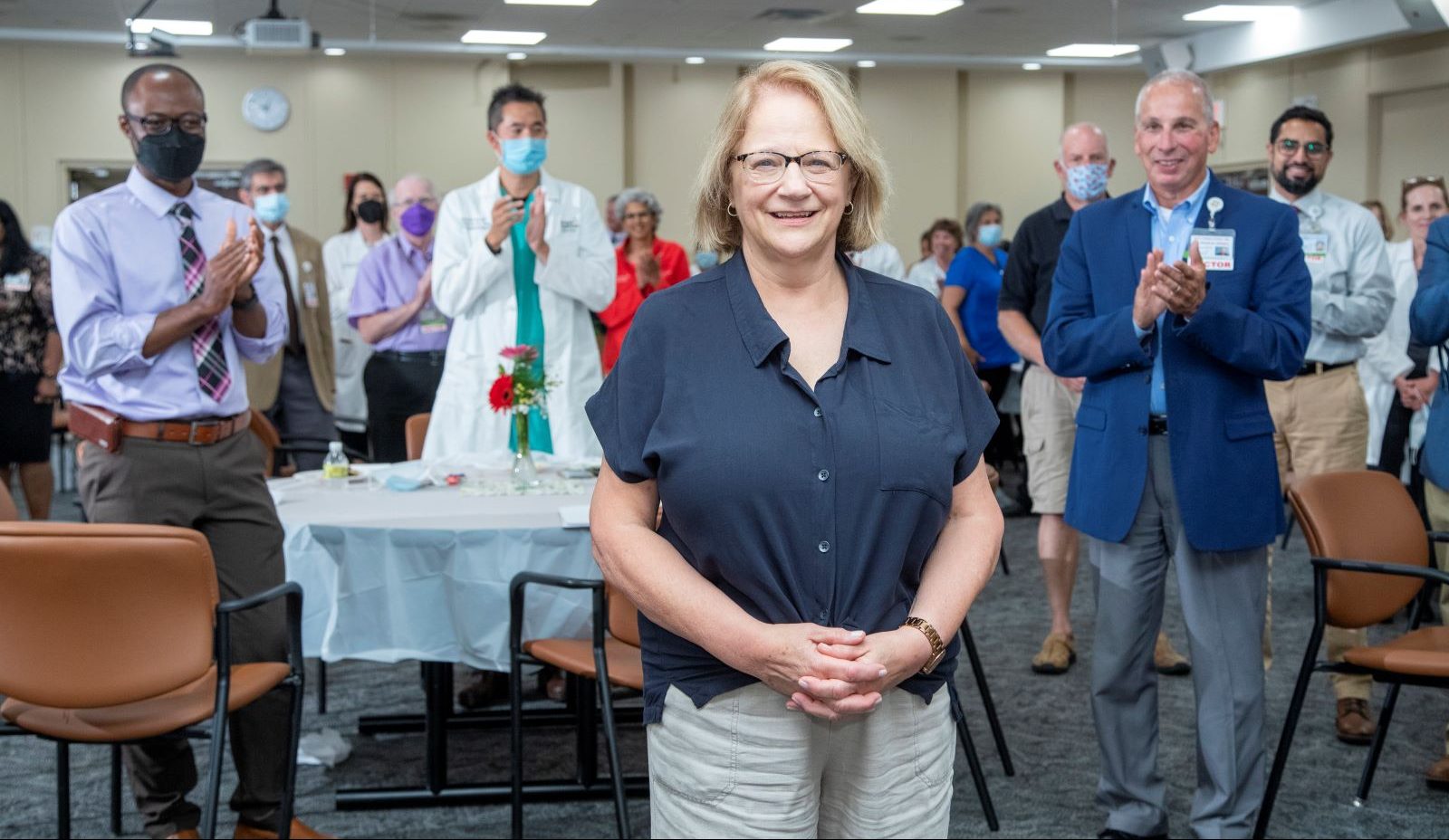<< Back
Virginia Bieluch, A Voice of Calm Through the Pandemic, Retires

July 21, 2022
She started her career at the onset of the AIDS epidemic, and she’s ending it with COVID and monkeypox. Virginia Bieluch, MD, chief of the division of infectious diseases at The Hospital of Central Connecticut and MidState Medical Center, will be the first to admit there is never a dull moment when it comes to germs.
“When I was just starting my career (around 1978), a lot of very famous physicians were saying we weren’t going to need as many infectious disease doctors because of all the antibiotics we had,” she recalled. “And then came AIDS. This field is certainly unpredictable.”
In her time as an infectious disease doctor there has been HIV/AIDS, Legionnaires disease, toxic shock syndrome, SARS 1, H1N1, ebola, COVID-19 and now monkeypox.
“It is an ever-changing field,” she said. “The vast majority of bacteria are our friends, but they can also wreak havoc with our bodies. And bacteria and viruses are incredibly clever at overcoming whatever we use to treat them.”
Bieluch will retire on July 30, closing out a 33-year career at HOCC.
Jeffrey Finkelstein, MD, FACEP, vice president of medical affairs for Hartford HealthCare’s Central Region, said Bieluch has left an indelible mark.
“She’s a highly valued, extremely talented infectious disease physician who is patient-centric and an excellent teacher,” he said. Bieluch was appointed chief just as COVID was arriving in Connecticut, he said, and “she was a great communicator throughout the pandemic.”
“At the beginning, we were learning every day, as was the rest of the world,” Finkelstein said of the pandemic’s first wave in 2020. “It was droplets, it was airborne, don’t wear masks, do wear masks. Our protocols to keep everyone safe were changing multiple times a day, and Virginia was there every step of the way, making good decisions and communicating clearly. I told her, ‘This is your infectious disease Super Bowl, and you’re winning.’”
Bieluch is also an associate professor of medicine at the University of Connecticut School of Medicine. It is that teaching part of her personality that made her a great leader, Finkelstein said. He recalled an incident early in the pandemic when a pregnant Emergency Department physician was terrified to treat a high-risk COVID patient.
“So Virginia gowned up and said to her ‘We will do this together’ and guided her through the whole PPE process. She made sure she was safe, and that she knew she was safe.”
Bieluch remembers that day. “I told her, I’ve been doing this a long time. PPE works. Let’s put on our PPE together, and we will go in together. It will be OK.”
Throughout the pandemic she has worked on COVID floors, treating patients. “It was important to me to show everyone that it was safe,” she noted.
A native of Hartford, Bieluch attended Smith College undergrad, and then University of Connecticut School of Medicine. She did her residency in Internal Medicine at Yale New Haven Hospital and a fellowship in Infectious Diseases at Tufts New England Medical Center. Her first five years were in Ohio, and then she came to New Britain.
It was during her residency that AIDS first came on the radar, and then while she was an Infectious Disease fellow in Boston that it became an epidemic. She still remembers those patients.
“We couldn’t cure people. We could manage their symptoms for a time, but they just got sicker and sicker. It was very hard, because so many of them passed away at such a young age. And I couldn’t do anything except alleviate some of their symptoms.”
“What is so amazing to me right now is how quickly we’ve made medical progress, developing treatments and vaccines. The science now develops so rapidly. With AIDS, it took years to even identify the cause and then more years to create the first treatment, AZT, which wasn’t even very good.”
During the first year – and since – of the COVID pandemic, Bieluch said she felt an obligation to “keep the public calm and have an understanding that we were learning as we went. It was ever-evolving.” She met with frontline healthcare workers, but also support staff throughout the system, as often as needed, to alleviate fears. She went on television and did interviews for newspapers and for HHC publications and social media. And she saw patients and stayed up to the minute on new information about the virus.
“I had a lot of support from family and friends, but I was tired,” she said. “We have a great team in the Central Region, and we all taught each other and supported each other. I will miss the people I have worked with. HOCC is like a family.”